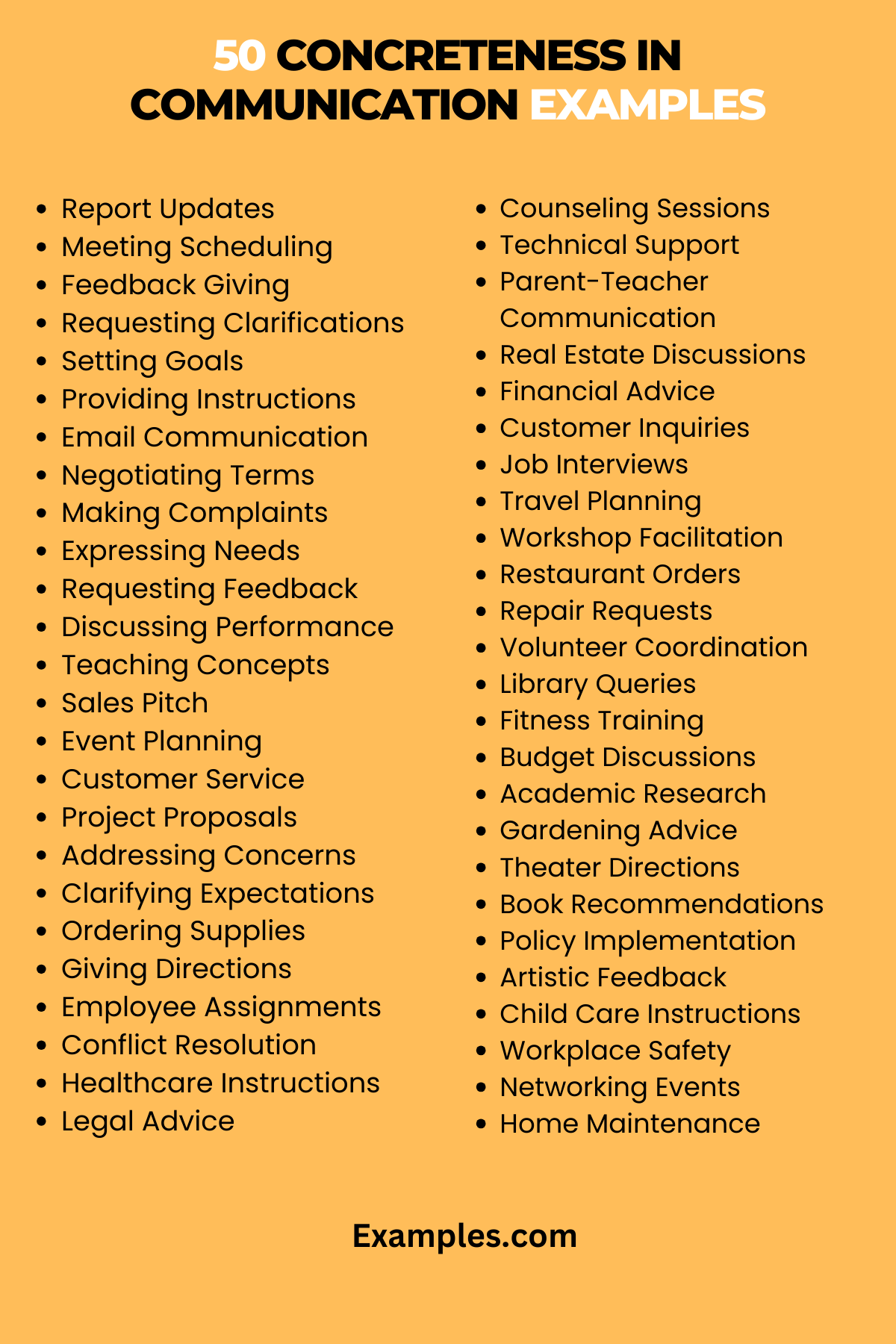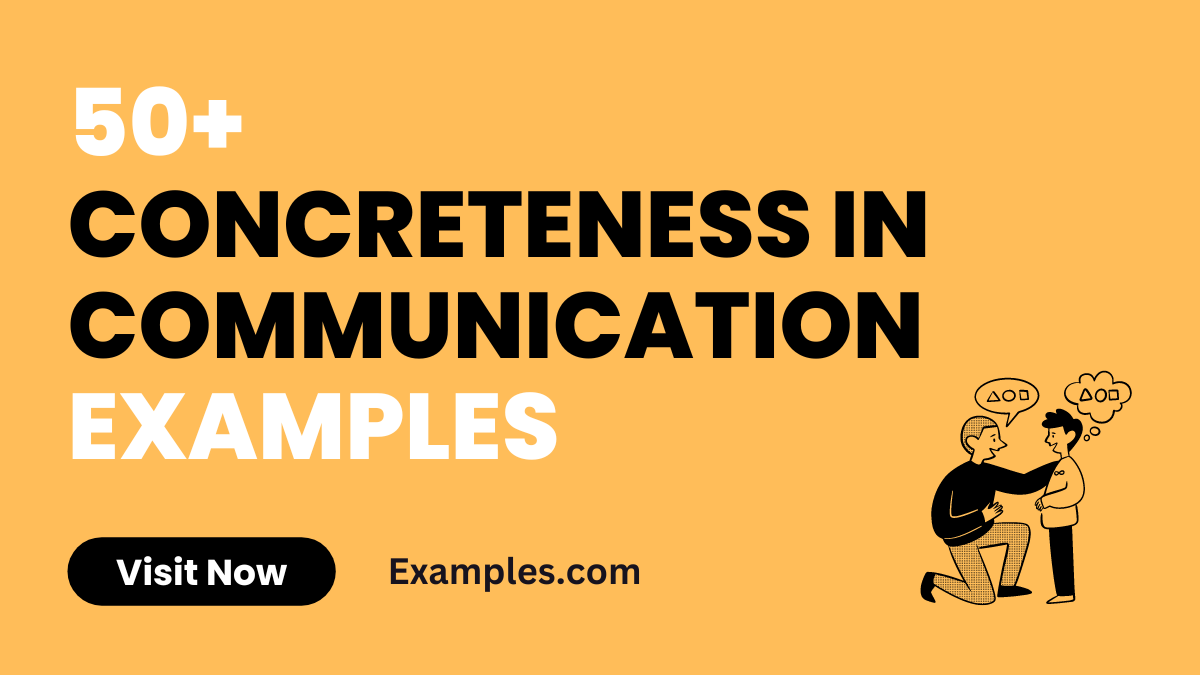49+ Concreteness in Communication Examples
Concreteness in communication is key to conveying clear and precise messages. Our comprehensive guide, enriched with diverse communication examples, delves into the importance of concreteness in various contexts, from business interactions to personal conversations. Through detailed and relatable examples, this guide illuminates how specificity in communication can greatly enhance understanding and effectiveness. Whether you’re a student, professional, or just keen on improving your communication skills, these insights and examples will prove invaluable.
What is Concreteness in Communication? – Definition
Concreteness in communication refers to the use of clear, specific, and vivid language that leaves little room for misunderstanding. This approach involves choosing precise words and examples, making the message easily graspable. Concreteness helps in eliminating ambiguities and confusion, ensuring that the receiver comprehends the intended message exactly as it is meant. It’s especially crucial in settings where precise information is vital, such as in business communication, educational contexts, and personal interactions.
What is the Best Example of Doctor-Patient Communication?
A prime example of concreteness in doctor-patient communication is seen when a doctor explains a diagnosis and treatment plan. In this scenario, the doctor uses simple, direct language to describe the patient’s condition, avoiding medical jargon. They might say, “You have an infection in your left lung, which is causing your cough and chest pain.” The treatment plan is explained with clarity: “We will start with a course of antibiotics for one week, and I’ll need to see you again next Thursday for a follow-up.” This example illustrates the importance of concreteness in healthcare communication, ensuring that the patient clearly understands their health condition and the prescribed treatment, thereby promoting effective and safe healthcare outcomes. Incorporating communication styles examples, such as empathy and clarity, further enhances the effectiveness of the interaction.
50 Concreteness in Communication Examples

In the realm of effective communication, concreteness is a vital component. This comprehensive list of 50 unique and distinct examples of concreteness in communication showcases the power of clarity and specificity. Each example is accompanied by a brief explanation and sample sentences, demonstrating how to incorporate concreteness into various communication scenarios. From business interactions to personal conversations, these examples cover a wide range of contexts, providing valuable insights for anyone looking to enhance their communication skills. Dive into these examples to transform the way you convey your messages, making them more understandable and impactful.
- Requesting a Report Update: Instead of saying, “How’s the report going?” be specific: “Can you update me on the sales report for Q4 by tomorrow afternoon?”
- Scheduling a Meeting: Rather than vague timing, say, “Let’s meet on Thursday at 3 PM in the conference room to discuss the project timeline.”
- Giving Feedback: Instead of “Good job on the project,” specify: “Your detailed analysis in the project was impressive, particularly the market research section.”
- Asking for Clarification: Don’t just ask, “Can you explain this?” Be precise: “Could you clarify how the new invoicing process works, particularly the digital submission part?”
- Setting Goals: Instead of “We need to improve sales,” try “Our goal is to increase sales by 15% in the next quarter by expanding our online marketing efforts.”
- Providing Instructions: Replace “Handle this task” with “Please compile a list of all current clients and categorize them based on their purchase history by Friday.”
- Email Communication: Instead of a vague subject line like “Meeting,” use “Meeting on March 10th – Project X Strategy Discussion.”
- Negotiating Terms: Rather than saying, “I want a better deal,” be specific: “I’m looking for a 10% discount on the total order if we commit to a six-month supply contract.”
- Making a Complaint: Don’t just say, “I’m not happy with the service.” Be specific: “I was dissatisfied because my food order was 30 minutes late and cold upon arrival.”
- Expressing Needs: Instead of “I need help with the project,” specify: “I need assistance with the data analysis section of the project by next Wednesday.”
- Requesting Feedback: Replace “What do you think?” with “Could you provide specific feedback on the presentation style and content clarity of my speech?”
- Discussing Performance: Instead of “You need to do better,” say “I’d like to see an improvement in your punctuality and project deadlines adherence.”
- Teaching Concepts: Don’t just say, “This is important.” Be clear: “Understanding these mathematical formulas is crucial because they are the foundation for more advanced topics in the next chapters.”
- Sales Pitch: Rather than a general pitch, use: “Our software can increase your team’s efficiency by automating 60% of repetitive tasks, saving an average of 5 hours per week.”
- Planning Events: Replace “Let’s organize an event” with “Let’s plan a team-building workshop for 20 people focusing on communication skills, scheduled for April 5th.”
- Customer Service: Instead of “How can I help?” ask “Are you looking for a specific model of the smartphone, or do you need assistance with features comparison?”
- Project Proposals: Don’t just say, “This project will be beneficial.” Be specific: “This project will reduce operational costs by 15% over six months by optimizing our supply chain.”
- Addressing Concerns: Instead of “I’m worried about the project,” articulate: “I’m concerned about meeting the project deadline of April 10th due to the current pace of work.”
- Clarifying Expectations: Replace “Do your best” with “I expect the report to cover all market analysis aspects and be submitted by next Monday without errors.”
- Ordering Supplies: Instead of “We need more supplies,” specify: “Please order 500 units of the X-brand toner cartridges by the end of this week.”
- Giving Directions: Don’t say “Go that way,” be clear: “Turn left at the next intersection, and you’ll find the post office two blocks down on your right.”
- Employee Assignments: Instead of “Work on the marketing campaign,” detail: “Develop a detailed plan for the social media aspect of the marketing campaign, focusing on Instagram and Twitter.”
- Conflict Resolution: Replace “Let’s solve this” with “Let’s discuss the specific issues regarding the team dynamics and find solutions to improve our communication.”
- Healthcare Instructions: Don’t just say, “Take your medication.” Be precise: “Take two tablets of this medication with water every morning after breakfast.”
- Legal Advice: Instead of “You have a case,” say “You have a strong case for a workplace discrimination lawsuit based on the evidence of unequal pay and the emails you provided.”
- Counseling Sessions: Replace “How do you feel?” with “Can you describe what you felt when you faced the situation at work last Tuesday?”
- Technical Support: Instead of “What’s the issue?” ask, “Can you tell me the exact error message you see when you try to start the software?”
- Parent-Teacher Communication: Don’t just say, “Your child is doing well.” Be specific: “Your child has shown remarkable improvement in math, especially in algebra and geometry.”
- Real Estate Discussions: Instead of “This is a good house,” detail: “This house features three bedrooms, two bathrooms, and a large backyard, ideal for families.”
- Financial Advice: Replace “Save more money” with “Setting aside 10% of your monthly income into a high-interest savings account can help build your emergency fund.”
- Customer Inquiries: Don’t say “What do you want?” ask “Are you looking for a specific type of outdoor gear, such as waterproof hiking boots or lightweight tents?”
- Job Interviews: Instead of “Tell me about yourself,” specify: “Can you discuss your experience with project management and how it applies to this role?”
- Travel Planning: Replace “Plan a trip” with “Let’s plan a 7-day trip to Japan, focusing on cultural sites in Kyoto and Tokyo, with a budget of $2000.”
- Workshop Facilitation: Don’t just say, “Let’s start the session.” Be specific: “We’ll begin with a 20-minute introduction to effective team communication, followed by group exercises.”
- Restaurant Orders: Instead of “I’ll have the usual,” say “I’d like the grilled salmon with a side of steamed vegetables, and no dressing, please.”
- Repair Requests: Replace “Fix this” with “Please repair the leaking faucet in the kitchen sink. It drips continuously, even when tightly closed.”
- Volunteer Coordination: Don’t just say, “Help out.” Be specific: “Please assist in setting up the charity booth, focusing on arranging the donated books by genre.”
- Library Queries: Instead of “Do you have books?” ask “Do you have any recent publications on renewable energy technologies available for borrowing?”
- Fitness Training: Replace “Work out more” with “Incorporate 30 minutes of cardio and 20 minutes of strength training into your daily routine to improve endurance.”
- Budget Discussions: Don’t just say, “We need to cut costs.” Be specific: “We should reduce our marketing budget by 10% and negotiate lower rates with our suppliers.”
- Academic Research: Instead of “Do research,” say “Conduct a qualitative study on the impact of social media on teenage mental health, using surveys and interviews.”
- Gardening Advice: Replace “Water your plants” with “Water your indoor plants twice a week, ensuring the soil is moist but not waterlogged.”
- Theater Directions: Don’t just say, “Find your seat.” Be precise: “Your seat is in row G, number 12, on the left side of the theater, near the aisle.”
- Book Recommendations: Instead of “Read a good book,” suggest: “Read ‘To Kill a Mockingbird’ by Harper Lee for its powerful themes of justice and moral growth.”
- Policy Implementation: Replace “Follow the rules” with “Ensure all team members complete the new data security training by the end of this month as per company policy.”
- Artistic Feedback: Don’t just say, “It’s nice.” Be specific: “The use of vibrant colors and bold strokes in this painting effectively conveys the theme of joy.”
- Child Care Instructions: Instead of “Take care of the kids,” say “Please ensure the kids have their lunch by 12 PM and a nap afterwards, and no screen time before dinner.”
- Workplace Safety: Replace “Be safe” with “Always wear protective gear, including helmets and gloves, when operating machinery in the workshop.”
- Networking Events: Don’t just say, “Meet people.” Be strategic: “Connect with at least five professionals in your field, focusing on those in marketing and sales.”
- Home Maintenance: Instead of “Clean the house,” detail: “Please vacuum the living room, dust the shelves, and mop the kitchen floor today.”
Concreteness in Business Communication Examples

In business communication, concreteness is crucial for clarity and effectiveness. This section provides 10 stellar examples of concrete communication in business settings. From emails to project planning, these examples demonstrate how specificity can prevent misunderstandings and enhance productivity. Each example is paired with practical sentences, illustrating how to apply concreteness in various business scenarios. Ideal for professionals and students, these examples are a guide to mastering communication in the corporate world.
- Project Deadline Communication: Instead of “Finish the project soon,” say, “Complete the project by March 15th, ensuring all testing phases are completed.” This sets a clear deadline and expectations.
- Budget Approval Request: Replace “We need more budget” with “I request an additional $5,000 for the marketing campaign to cover the cost of new online advertising platforms.”
- Employee Performance Review: Don’t just say, “Improve your performance.” Be specific: “Enhance your sales skills by attending the upcoming online training session on advanced sales techniques.”
- Client Proposal Submission: Instead of “Send the proposal,” specify: “Submit the detailed proposal for the X project, including budget and timeline, to the client by April 5th.”
- Feedback on a Presentation: Replace “Good presentation” with “Your presentation on market trends was informative, especially the analysis of consumer behavior in the last quarter.”
- Email Communication: Instead of “Let’s discuss,” write, “I’d like to schedule a meeting on March 20th at 10 AM to discuss the Q2 sales strategy.”
- Setting Sales Targets: Don’t just say, “Increase sales.” Be precise: “Aim to increase sales by 20% in Q3 by targeting new demographics and expanding online marketing.”
- Supply Chain Issues: Replace “Fix the supply issue” with “Identify the cause of the delay in the supply chain for product X and resolve it by next week.”
- New Policy Implementation: Instead of “Follow the new policy,” communicate: “Adopt the new remote work policy starting April, which includes mandatory weekly team meetings and daily status updates.”
- Negotiating Contracts: Don’t say, “Get a better contract.” Be specific: “Negotiate to reduce the delivery time in the contract to two weeks instead of four.”
Concreteness in Oral Communication Examples

Oral communication thrives on concreteness to ensure the message is understood as intended. This section presents 10 examples of how concreteness can be effectively used in spoken interactions. These examples span various contexts, from everyday conversations to professional meetings, showing how specificity can greatly improve communication. Accompanied by example sentences, these instances are perfect for anyone looking to refine their verbal communication skills.
- Explaining a Process at Work: Instead of “Do it this way,” explain: “Start by logging into the system, then enter your data into the ‘New Entries’ tab.”
- Giving Directions: Don’t just say, “Go somewhere around there.” Be clear: “Walk two blocks north, then turn right at the library. The coffee shop is right across the street.”
- Ordering Food: Replace “I want something spicy” with “I’d like the chicken curry, and please make sure it’s extra spicy, similar to last time I ordered.”
- Planning a Family Outing: Instead of “Let’s go out this weekend,” suggest: “How about we visit the new science museum on Saturday around 11 AM?”
- Discussing a Book in a Club: Don’t just say, “It’s interesting.” Be specific: “The book’s portrayal of 19th-century France provides a unique perspective on the social dynamics of that era.”
- Responding to a Customer Query: Replace “It comes in different sizes” with “This model is available in three sizes – small, medium, and large, each with distinct features.”
- Making a Classroom Announcement: Instead of “Exam coming up,” announce: “The final exam will be on April 10th, covering chapters 5 to 8. It’s a three-hour written test.”
- Conducting a Meeting: Don’t say, “Let’s meet sometime next week.” Be precise: “Let’s schedule our next meeting for Wednesday at 2 PM to finalize the project details.”
- Giving a Toast at an Event: Replace “To a great life” with “Here’s to John and Sarah, may your journey together be filled with love, laughter, and endless happiness.”
- Explaining a Medical Condition to a Patient: Instead of “You’re a bit sick,” clarify: “You have a mild bacterial infection in your throat, which is why you’ve been experiencing discomfort and fever.”
What is the Effect of Concreteness in Communication?
The effect of concreteness in communication is profound and multifaceted. Concreteness, which involves using specific and clear language, significantly enhances the clarity and effectiveness of communication. It aids in reducing misunderstandings and ambiguities, ensuring that the message is understood exactly as intended. In scenarios like crisis communication examples or marketing communication, where precision is paramount, concreteness helps in delivering messages that are direct, understandable, and impactful. This aspect of communication is particularly essential in professional communication examples, where conveying exact information is critical for decision-making and operations. Concreteness also plays a vital role in intercultural communication examples, where it helps bridge language and cultural barriers, making communication more effective across diverse groups.
Benefits of Concreteness in Communication

The benefits of concreteness in communication are numerous and significant. Firstly, it leads to greater clarity and understanding. When messages are concrete, they are less prone to misinterpretation, which is crucial in settings like internal communication examples or technical communication examples. Secondly, concreteness enhances the persuasiveness and impact of communication. In marketing communication and sales, using specific and vivid language can more effectively persuade and engage the audience. Thirdly, it fosters trust and credibility.
In professional settings, being concrete in communication, as seen in communication objectives examples or communication strategy examples, demonstrates knowledge and confidence, building trust with colleagues and clients. Additionally, concreteness aids in efficiency, as clear and precise messages reduce the need for follow-up clarifications, saving time and resources. This is particularly valuable in fast-paced environments where timely and accurate information exchange is crucial, as seen in synchronous communication examples or communication technology examples.
Concreteness in Communication Skills

Concreteness is a pivotal aspect of effective communication skills, playing a crucial role in both personal and professional settings. It involves using clear, specific, and unambiguous language that leaves little to interpretation. This skill is particularly important in areas like business communication examples, where conveying precise information is essential. In educational contexts, such as teacher-student interactions or communication examples for students, concreteness helps in delivering educational content more effectively.
Similarly, in healthcare, as seen in doctor-patient communication examples, concreteness ensures that medical information is understood accurately. Developing concreteness in communication skills also enhances one’s ability to engage in assertive, yet respectful dialogue, as seen in aggressive communication examples. This skill is vital in conflict resolution communication, where clear and direct language can prevent misunderstandings and facilitate solution-oriented discussions.
Importance of Concreteness in Communication
The importance of concreteness in communication cannot be overstated. It is fundamental in ensuring that messages are conveyed and received with the intended meaning, a critical aspect in effective communication examples. In the realm of professional communication examples, concreteness helps in setting clear expectations, delivering instructions, and providing feedback, thereby enhancing workplace efficiency and productivity. In interpersonal relationships, including communication in relationships and family communication examples, being concrete aids in expressing thoughts and feelings clearly, fostering better understanding and stronger connections.
Concreteness is also vital in global communication challenges, such as in cross-cultural communication examples or intercultural communication examples, where it helps in minimizing the potential for misinterpretation due to cultural differences. Moreover, in an increasingly digital world, where digital communication and email communication are prevalent, concreteness is key to ensuring that messages are concise and clear, despite the lack of non-verbal cues.



